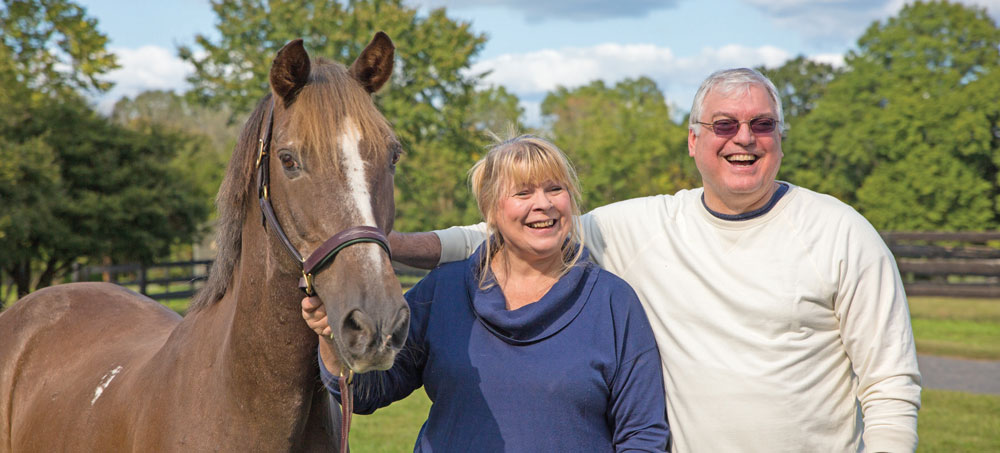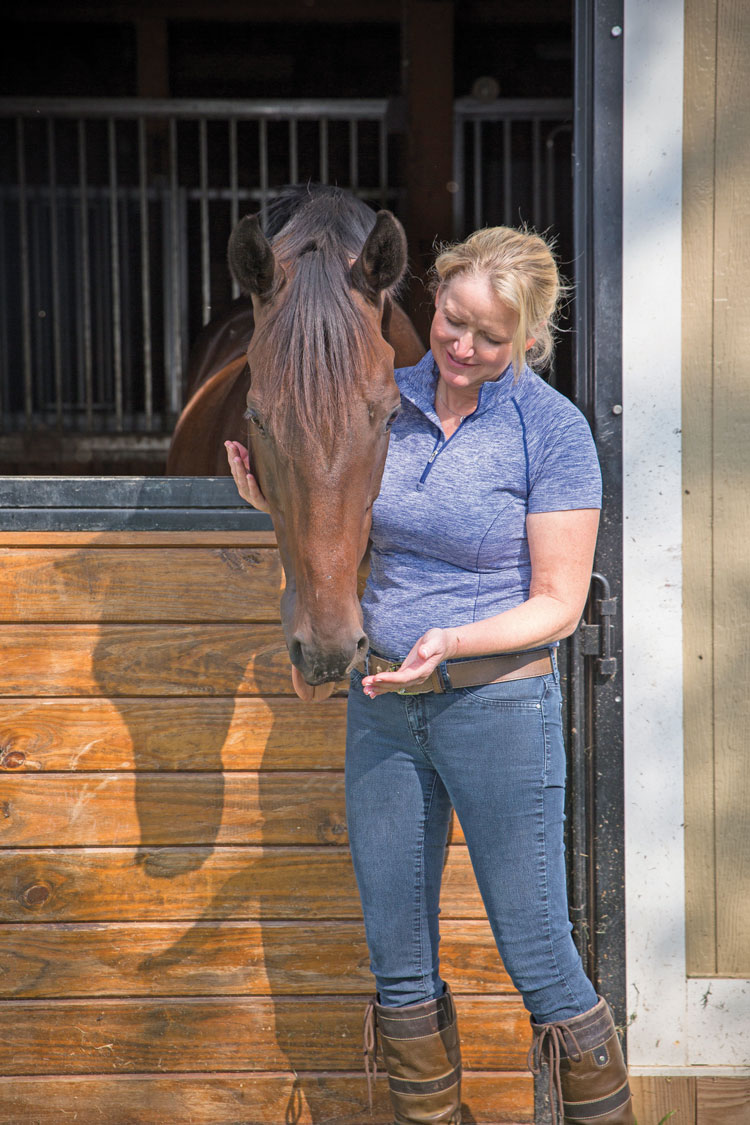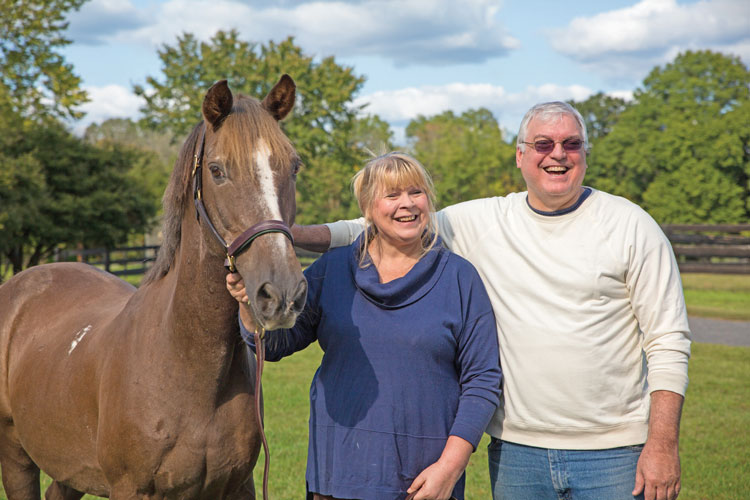The Heavens for Horses, Here In Aldie

Story and photos by Callie Broaddus
Raise your hand if you’ve felt the pang of guilt that comes along with not rescuing an animal in need. (Don’t actually raise your hand; you’ll look ridiculous.) Photos of skinny horses—too many unwanted or neglected horses to count—flood our newsfeeds daily. We can’t save them all, so we try to block it out. Raise your hand if you’ve felt the pang of guilt that comes along with not rescuing an animal in need. (Don’t actually raise your hand; you’ll look ridiculous.) Photos of skinny horses—too many unwanted or neglected horses to count—flood our newsfeeds daily. We can’t save them all, so we try to block it out.
That’s where Cherry Tapley, Melissa Pankas, and Shane Richitt put their hands down. Tapley started riding five years ago, but she’s loved horses her whole life. As she dedicated more of her time to learning horsemanship and proper care, she learned of the less-glamorous side of the horse world, the side with too many ribs and not enough loving homes.
Hawaiian-born Pankas and her husband had just purchased a 25-acre farm off James Monroe Highway in Aldie, Virginia, in January of 2015, in order to preserve the land from development and share it with the local horse community. When Tapley shared her dream of rescuing horses with Pankas, everything clicked.
“Cherry magically appeared into our lives,” says Pankas. “And with her passion, drive and love for horses we just knew it was all meant to be, and Nalani Horse Recovery became a reality.”

Ritchitt, who grew up around horses, joined the duo in early 2015, and became the third board member when Nalani Horse Recovery was established as a 501(c)(3) organization in May of 2016. The trio are now joined in their efforts by a generous network of volunteers and involved members of the community. They have rescued three horses from various walks of life, and they registered their first adoption success story in the last week of September, 2017.
“Nalani,” which means “the heavens” in Hawaiian, is not intended to be a permanent haven for rescues. “Our goal is to figure out what the horse can do and what they want to do, what they would be good at,” explains Tapley. “We don’t want to say, ‘Let’s make this horse a therapeutic riding horse,’ or ‘Let’s try to make this horse a hunter/jumper.’ We want to see what their personality is, where they are going to be happy.”
But that’s easier said than done for someone who doesn’t have a lifetime of riding knowledge to fall back on. “The big thing is that I’m not a trainer,” says Tapley, of her relatively recent foray into the horse world. “I have to be dependent on other people to step in and offer their time and their expertise.”
Trainers have stepped up to the plate to participate in this all-volunteer effort. But without many connections within the “horse world,” Tapley says the majority of her volunteers are people like her: “They’ve always wanted to do it, and they just want to be here so badly. But the people who come to the [fundraisers] and donate, they’re honestly mostly people that we’ve reached through my network or Melissa’s network, who had no idea that there needed to be a horse rescue.”
This outsider’s view into the insular world of horses gave Tapley the idea to take horse rescue and recovery to a broader audience through horse sponsorships. “I had this idea… we could do $40 a month, and that person gets to spend an hour a week with [the horse],” says Tapley. “And it would be with me or with a volunteer; they don’t necessarily have to be a horse person. They can be with someone who is, who can make sure they’re safe.”
One of Nalani’s three charges is an 18-year-old former cart horse named Lincoln, who caught the eye of Ritchitt at the New Holland auction in Pennsylvania. “Shane was determined to rescue him,” says Tapley. “He went head to head with the kill buyer and got him to back down so we could save Lincoln within the budget we had set.”

Mark and Susan Rivest began sponsoring Lincoln after visiting Nalani and falling in love with the chestnut gelding. The couple comes out every week just to stand by his stall, groom him, and take him out to graze in hand.
“Susan had been sponsoring a rescue up in New York, but this was an opportunity to really get involved locally,” said Rivest, showing me the new halter they had purchased for Lincoln.
“I told Cherry, ‘He’s going to go from being a rescue to being a snob!” Susan said with a laugh, adding that “horse therapy is the best therapy.”
Of course, the supplemental sponsorship fees are not enough to cover all the costs. But the Nalani team now have three successful party fundraisers under their belt and a track record of fiscal responsibility.
“We’re very careful with money. We don’t want to get in over our heads,” Tapley says. “You always read about rescues that have to be rescued from. And I just want to be sure that we always have enough money to do whatever we need to do. If they need a surgery, whatever it is, I want to make sure the money is there.”
The team at Nalani is entering the next exciting phase after a successful recovery and adoption of their rescue, Riser. “He is a little older and has some stiffness in his back legs—it appears that he was a Western speed horse who can no longer do that job. His adopter will trail ride him lightly and enjoy riding him bareback,” Tapley concludes. “This opens up a slot in the barn for us to go out and save another life. I can’t think of anything more rewarding than that!”
“Not a day goes by where we don’t reflect on how thankful we are for all the volunteers and community support,” says Pankas. “It is all about the horses and our heartfelt desire to make a positive difference.”
If you raised your hand (physically or mentally) at the beginning of this article, you’re not alone. But if you’re interested in making a difference, organizations such as Nalani Horse Recovery are always grateful for your time, expertise, or a few bucks.
For more information, go to virginiahorseback.com/horse-rescue. ML


